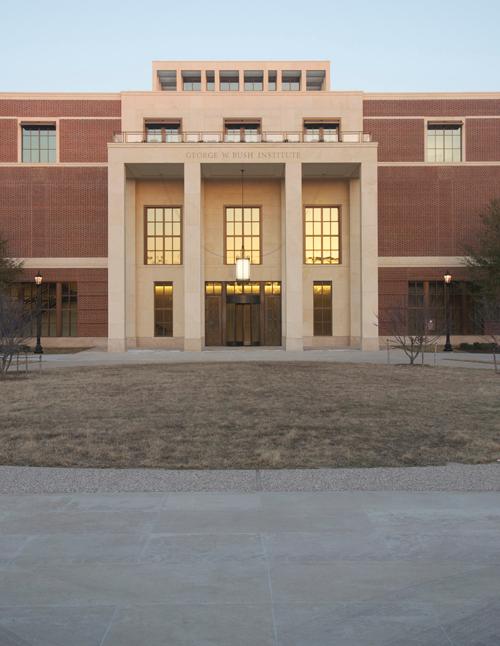
The George W. Bush Presidential Center is set to open on April 25 and open to the public on May 1. (Rebecca Keay / The Daily Campus)
Less than a month remains before the opening of the latest in a long and storied history of presidential libraries upon SMU campus on April 25.
Many professors have gone on record for or against the Bush Libraries presence here at the Hilltop, and many reasons still remain open to discussion, even in the eleventh hour of its grand ceremony.
“There was a lot of dispute at the beginning,” Ed Countryman, distinguished professor of history at SMU, said.
Countryman was a leading figure of a faculty senate that found itself divided on how to address the issues of an important and controversial presidency being embodied on this campus.
“There was a deep split [in the senate] between whether or not we should oppose the institution altogether,” Countryman said. “I personally abstained from it and that kind of turned it.”
The professor clarified some of his bigger concerns with the library by stating what could happen to the overall funding of the school in specific areas that are still desperately needed.
Presidential libraries have never come at a cheap price, and the $250 million Bush Center will be no exception.
If funding for the library takes away from the university’s need to grow and further develop its present libraries, then standards for SMU’s central ideologies could become problematic.
A voice of experience on this matter is the Director of the Center for Presidential History, professor Jeffrey Engel.
Engel spent the last eight and a half years at Texas A&M and was around the Bush Sr. Presidential Library enough to know what good has come to College Station since its arrival.
“SMU is poised to become an open forum for discussions on a range of issues,” Engel said.
Both Engel and Countryman expressed the ability of the library to be a major positive for the campus, provided that it remains as neutral as possible.
According to chronicle.com, over 10 percent of the professors on campus signed a letter given to President R. Gerald Turner expressing doubt that the Bush Center would be able to express a nonpartisan view on campus.
“As a University, this is a place where there should be free and open discourse,” Countryman said. “I’m quite sure there are people who value that [at the Bush Center], but the presence of an openly political view on campus could be problematic for them.”
In response to these thoughts, many professors do not believe this will be the case, and as Engel points out, the sun will continue to rise after April 25.
“After several years [of the Bush Sr. center being opened], people realized the sky didn’t fall, the world didn’t end, and more importantly, the presence of a presidential library provided opportunities that otherwise wouldn’t have been there,” Engel said.
“Opportunities for students and especially professors that enabled them to better understand their world and what they were doing that also in no way, shape or form came with political baggage.”
Engel, who is a first-year professor at SMU, went on to point out how difficult it became to get work done in College Station due to how many events and interesting people would arrive on Texas A&M’s campus, but only because of the library’s presence.
Tony Pederson, the Belo Distinguished Chair in Journalism professor at SMU, had a different concern back in January 2007, stating for The New York Times he had wished for more facts from the outset.
“There’s been a lack of transparency from the beginning,” Pederson told the New York Times.
After six years of waiting for more details, Pederson admits the details of the raised money have not been given, but the presence of the Library has already been felt.
“The Bush center brought over Egyptian women for International Women’s day,” Pederson said. “That’s what the intent of the center is: to reach out to people on a global scale.”
Time will tell if the Bush Center keeps SMU an open and politically unaligned university, but the opportunities for the student body cannot be understated.








